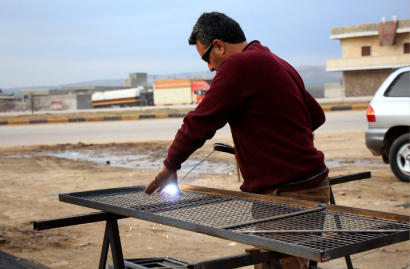
Introduction
WATAN’s Food Security and Agriculture (FSA) sector is dedicated to meeting the immediate and lifesaving needs of conflict-affected populations while also building their resilience as they recover from disasters. FSA aims to address the root causes of food insecurity and bring about sustainable poverty reduction and nutrition outcomes by improving community capacities and skills. The sector’s history dates back to 2012, with the distribution of food baskets in Homs, Hama, Aleppo, Damascus rural, and Deir Ezzor. Over time, the sector expanded its focus to include strategic crop cultivation, agricultural tools, and services to support livestock. WATAN’s FSA sector equips farmers and vulnerable individuals with the skills, technologies, and start-up capital necessary for them to sustainably grow food and/or start income-generating activities. The sector focuses on impactful interventions such as micro-grants and value chain projects in both agricultural and livestock sectors to achieve sustainable long-term outcomes.

Mission
- Increase the number of Syrian families who are well-nourished, help them to be productive and efficient families, in addition to ensuring a decent life for them.
- Ensure food security and sustainable development by improving the lives of the most vulnerable through promoting the sustainable use of available resources, including equitable sharing, and sharing of benefits arising from implemented projects.
- Focusing on people who aren’t able to produce enough food and income or do not have the means to obtain the minimum family requirements for an active and healthy life.
AREAS OF EXPERTISE
WATAN analyzes the context and circumstances of agriculture vulnerability in both urgent situations and chronic crises. This analysis helps WATAN better comprehend vulnerability, wants, and preferences and is essential to the creation of comprehensive, integrated solutions that support long-lasting solutions.WATAN’s Food Security and Agriculture (FSA) Sector is frequently delivered in conjunction with other sectors and varies substantially depending on the situation. They concentrate on three key areas:During and soon after an emergency, ensuring access to food and the safeguarding of livelihoods, mostly through ready-to-eat rations, free bread, food baskets, cash support, and in-kind transfers.Support affected households and communities in protecting household and agriculture systems, averting erosion of productive assets, and support households and communities in restoring productive assets. Securing agriculture during the recovery phase by restoring and bolstering community and household resources, capacities, and methods through several unique Agriculture, Livestock, and Irrigation projectsIncreasing self-employment, paid work, and entrepreneurship in rural and urban areas to advance improved food security, and the improvement of household resilience, such as (Small business grants, supporting food processing, creating job opportunities related to agriculture, livestock, and irrigation activities, and Cash for work) projects.
SECTOR IMPLEMENTATION

SECTOR PHILOSOPHY AND DIFFERENTIATORS
WATAN analyzes the context and circumstances of agriculture vulnerability in both urgent situations and chronic crises. This analysis helps WATAN better comprehend vulnerability, wants, and preferences and is essential to the creation of comprehensive, integrated solutions that support long-lasting solutions. WATAN’s Food Security and Agriculture (FSA) Sector is frequently delivered in conjunction with other sectors and varies substantially depending on the situation. They concentrate on three key areas: During and soon after an emergency, ensuring access to food and the safeguarding of livelihoods, mostly through ready-to-eat rations, free bread, food baskets, cash support, and in-kind transfers. Support affected households and communities in protecting household and agriculture systems, averting erosion of productive assets, and support households and communities in restoring productive assets. Securing agriculture during the recovery phase by restoring and bolstering community and household resources, capacities, and methods through several unique Agriculture, Livestock, and Irrigation projects Increasing self-employment, paid work, and entrepreneurship in rural and urban areas to advance improved food security, and the improvement of household resilience, such as (Small business grants, supporting food processing, creating job opportunities related to agriculture, livestock, and irrigation activities, and Cash for work) projects.
SECTOR FRAMEWORK

SECTOR PROJECTS

Livestock vaccination campaign for epidemics in smallholder dairy animals in NWS
⟟ Locations
Idleb and Aleppo
👤 No. beneficiaries
99,423

Food sourcing and living conditions Improving for newly internally displaced people in northern Syria
⟟ Locations
Idleb
👤 No. beneficiaries
273,514

Supporting affected families by restoring and creating income-generating opportunities to sustain life
⟟ Locations
Idleb and Alepp
👤 No. beneficiaries
12,500

2021 PPR Vaccination Campaign in North West Syria
⟟ Locations
Idleb and Aleppo
👤 No. beneficiaries
246,000

PPR Vaccination Campaign in North West Syria
⟟ Locations
Idleb and Aleppo
👤 No. beneficiaries
20,640

Artificial insemination and fertility treatments for smallholder dairy cattle & sheep in NW Syria
⟟ Locations
Idleb
👤 No. beneficiaries
8,722

Newcastle Disease vaccination of smallholder chicken in northwest Syria
⟟ Locations
Idleb and Alepp
👤 No. beneficiaries
720,000

Support for village-based animal feed production in NW-Syria
⟟ Locations
Idleb and Alepp
👤 No. beneficiaries
24,000

Vaccinations and mange treatments for smallholder dairy animals in NW Syria
⟟ Locations
Idleb and Aleppo
👤 No. beneficiaries
175,000

food securing for the affected people by the earthquake
⟟ Locations
Idleb and Aleppo
👤 No. beneficiaries








